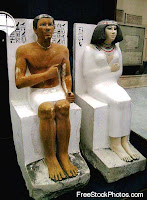 ed it well. You know: cards, monitors, keyboards, mice. A wide array of utilities. Firewall. Other Security. It has no reason for complaint.
ed it well. You know: cards, monitors, keyboards, mice. A wide array of utilities. Firewall. Other Security. It has no reason for complaint.I should have stayed with this.
Okay, so I talk to my computer. I plead with it. Sometimes I yell at it. Big Deal! Lots of people do that---and I have good reasons just like anyone else. I can't have the computer arrested and hauled off to jail, you know. On several occasions I've threatened to bounce its innermost electronic circuitry off a brick wall---but I need it, and I'm stuck with it for the moment. At least until my new computer shows up. [Shhh! Don't let my old computer know about that, it might fall completely apart, and I can't afford a computer analyst.]
My computer needs a new name. My brother originally called it 'knucklehead' when he set it up. I'm sure he thought that was funny, but apparently my tower of electronic gibberish is living up to its current name. So any change of name must be as properly descriptive. [I tried to use the words onomatopoeia and onomatopoeic here to impress all you readers, but they don't quite fit the bill.]
Anyway, based on what I've been calling it lately [at various decibel levels,] I've a lot of names to choose from: 'C'monnnnn!!!'; 'C'mon dammit!! ' 'Stop this!!!' 'Damn You!' 'Not Again!!' 'Arggghhh!!!'---though I don't have a drop of pirate blood in my veins, so help me. But, I'm sort of partial to 'Damn Thing!' at the moment---'Dammette!' for short.

And this.
My computer constantly freezes during my work, no matter the program. [Doesn't global warming affect computers?] My cursor [great name!] disappears and appears with a rationale all its own. The program I use most is driving me up a wall. I type in words and I see authentic, electronic gibberish on the screen. The cursor jumps around all over the place, moving words by itself. I have to be careful deleting a letter or a word, because just as I hit the 'delete' key it often highlights whole paragraphs, and I delete everything. I'm often reduced to the two-finger typing style. [The publisher says it can't duplicate the problem, so it must be me. Yeah, right!] Because of all this, I have to make a liberal use of the 'restart' option.
I've been told some of my programs are 'incompatible' with the operating system. What!!! I use Microsoft XP with all the updates. What do you mean 'incompatible?' Perhaps Bill Gates owes me a new computer? [He's not responsible, but he does have more money than the software developer of my db program.]
With all my programs, 'the Damn Thing' makes its presence known by freezing and flashing all over the place. [Electronic version of the Wave?] The manufacturer says the problem can be fixed if I
 take all my files off the hard disk and we set it up again. And I get to put all my data where? And how? Big deal!
take all my files off the hard disk and we set it up again. And I get to put all my data where? And how? Big deal!And this.
Now, I readily admit that I do suffer from a bit of fumble fingers, and I'm told that comes from trying to type info as fast as I did when I was younger, and I no longer can do it---though I've determined separately that much of that problem comes from the side effects of a pain medication I'm on. Besides, when you have software and hardware working together to destroy your psyche, your concentration does wander a bit. N'est Pas?
My frustration is also increased---necessarily, I sadly admit---from the numerous alarms I have set on my various computer timepieces for medication, a movie, meeting, or other special need. I tend to get absorbed in my writing, research, and the damning of my computer, thus forgetting everything else. I also have this tiny program which freezes the computer for thirty seconds every three hours [as I've set it] while a picture of an animated and stern, but kindly, woman with an apron and a rolling pin makes rude noises and tells me to take a break. I don't question her. I take the break.
So my writ
 ing is now being done with Open Office Writer. [It's the only word processor that doesn't have all the problems. I guess that comes from its being free.] Open Office Suite is a worthy answer [and it's free] to Microsoft Works Plus. I'll copy this essay into my regular program later.
ing is now being done with Open Office Writer. [It's the only word processor that doesn't have all the problems. I guess that comes from its being free.] Open Office Suite is a worthy answer [and it's free] to Microsoft Works Plus. I'll copy this essay into my regular program later.The 'Damn Thing' in recent days.
And when the changing-of-the-guard occurs, you're all invited to 'the Damn Thing's' 'mother board execution,' [by lethal rejection, of course] at dawn on the second Tuesday after the third Friday of the second blue moon month of Summer. I know the word 'mother' is involved here, but despite that, it's a necessary event. Here it comes: It's a dirty job but someone has to do it! Yo! I'm qualified!
This is now the morning after, and some of my programs are working quickly as God intended. Perhaps threatening the old tower of gibberish---excuse me, the 'Damn Thing'---helps control it's anti-human feelings. And I'm certainly feeling more human today. I did some cleaning, cooking, treadmill, and took a shower. You really wanted to know that, didn't you?






